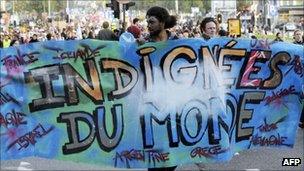Eurozone told to get its house in order
- Published
- comments

Protests demonstrated there is no appetite for public money being used to rescue the banks yet again.
The fears for the global economy have brought with them a glut of summits and international meetings. It is easy to be cynical as communiques fail to live up to their words shortly after they are written.
Yet they provide a platform for old-fashioned megaphone diplomacy.
The eurozone leaders haven't liked it. They have been phoned from the White House, cajoled in interviews and told bluntly to get their house in order, to fix the crisis.
The result of all this, in the judgement of the British Chancellor of the Exchequer, George Osborne, is that there is now real momentum to resolving the euro-zone crisis.
He, for one, is more confident that the crisis can be brought under control within weeks.
This is not that all disagreements will vanish but that the building blocks will be there to fix the problem.
Tim Geithner, the US Treasury Secretary, said: "We heard encouraging things about a new comprehensive plan."
But he clearly had reservations. He noted that the leaders of France and Germany said they would have a framework in place in the next two weeks.
"They clearly have more work to do on the strategy and the details," he observed.
Comprehensive plan
The broad outline of the plan is known:
Step 1 will be to start using the newly-approved EFSF - the zone's main bail-out fund. It will be able to help banks and countries in difficulty. There is growing acceptance that it will have to be beefed up so that it can even rescue big economies like Italy.
Step 2 will be to strengthen the banks particularly those in France which are heavily exposed to Greek debt. Although we don't know the details the French and the Germans say they have reached agreement on injecting more capital into the banks.
Sept 3 will follow from steps 1 and 2. When the banks can stand the shock, Greece will be allowed a managed default with investors taking a 50% hit. Half of Greek debt will be written off.
That is the broad strategy but, at every turn, there are risks and dangers.
Many voices are calling for the EFSF to increase its firepower from 440bn euros to two trillion euros.
Massive umbrella
But the Germans have made it clear they don't want the taxpayer to take more of the strain.
Many suggestions have been made but no recipe has been found for expanding the fund.
Some emerging countries have questioned whether the eurozone can provide this massive umbrella on its own. They have suggested expanding the resources of the IMF.
That is on the agenda and will remain there until the G20 summit in Cannes.
George Osborne is very clear that if the fund is given more punch it has to be for the benefit of the rest of the world, not just the euro-zone.
He will also be wary that with Britain paying 5% of the IMF's costs, any new role for the fund could end up with Britain paying more to rescue the eurozone.
Then there is strengthening the banks. The risk there is that if banks have to build up their capital they will have less money to lend.
The last thing a fragile economy needs is lending drying up.
And as the protests demonstrate this weekend, there is no appetite for public money being used to rescue the banks yet again.
Weary of austerity
As regards Greece, its debts are not sustainable. Even an imaginary growth rate of 8% would not do it.
Greece's debts will have to be cut by between 50% and 60%.
The French finance minister said France would reject any solution that led to a credit event (where the losses were forced rather than voluntary).
Investors who might have been willing to take a 21% hit, might not sign up to a much bigger loss.
And then there are the Greek people, weary of austerity. They may yet have their say.
And when officials talk of a "managed" default of Greece, they cannot guarantee it.
Even if Greek banks and banks across Europe are ring-fenced there is nothing to stop investors deciding that they will cut and run from Portugal or demand higher returns from Italy.
Beyond that lie the states of Italy and Spain, with virtually no growth, and a lost generation of jobless young people.
It is worth reflecting that the President of the European Council, Herman Van Rompuy, mused that the European way of life with its high social spending could not be maintained without 2% growth.
Change, disturbing and unsettling is coming.
All of this explains why the German Chancellor Angela Merkel said this week-end that there was no 'big bang' solution which ends everything.
Those who raise such hopes, she said, "have either lost patience or don't understand the extent of the challenges."
It might be that in the weeks ahead, Europe's leaders calm the markets - but in the end they will have to provide details.